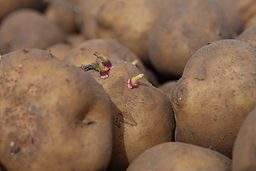Amflora
| Amflora | |
|---|---|
 |
|
| Event | EH92-527-1 |
| Identifier(s) | BPS-25271-9 |
| Plant | Solanum tuberosum L. |
| Mode | Transgenesis |
| Method | Insertion |
| Vector | pHoxwG |
| Developer | Svalöf Weibull AB |
| Trait(s) conferred | Decreased amylose production, increased kanamycin resistance |
| Genes introduced | Granule bound starch synthase, neomycin phosphotransferase II |
Amflora (also known as EH92-527-1) is a genetically modified potato cultivar developed by BASF Plant Science. "Amflora" potato plants produce pure amylopectin starch that is processed to waxy potato starch. It was approved for industrial applications in the European Union on 2 March 2010 by the European Commission. In January 2012, the potato was withdrawn from the market in the EU.
Originally registered on 5 August 1996, Amflora was developed by geneticist Lennart Erjefält and agronomist Jüri Känno of Svalöf Weibull AB.
After the European Commission's approval of the potato, BASF announced it was going to produce Amflora seed starting in April 2010 in Germany's Western Pomerania (20 ha) and Sweden (80 ha). It also announced it was planting 150 ha in the Czech Republic "for commercial aims with an unnamed partner."
Due to lack of acceptance of GM crops in Europe, BASF Plant Science decided in January 2012 to stop its commercialization activities in Europe and would no longer sell Amflora there, but it would continue seeking regulatory approval for its products in the Americas and Asia.
In 2013, an EU court annulled the approval of BASF's Amflora, saying that the EU Commission broke rules when it approved the potato in 2010.
Waxy potato varieties produce two main kinds of potato starch, amylose and amylopectin, the latter of which is most industrially useful. The Amflora potato has been modified to contain antisense against the enzyme that drives synthesis of amylose, namely granule bound starch synthase. This resulting potato almost exclusively produces amylopectin, and thus is more useful for the starch industry.
...
Wikipedia
